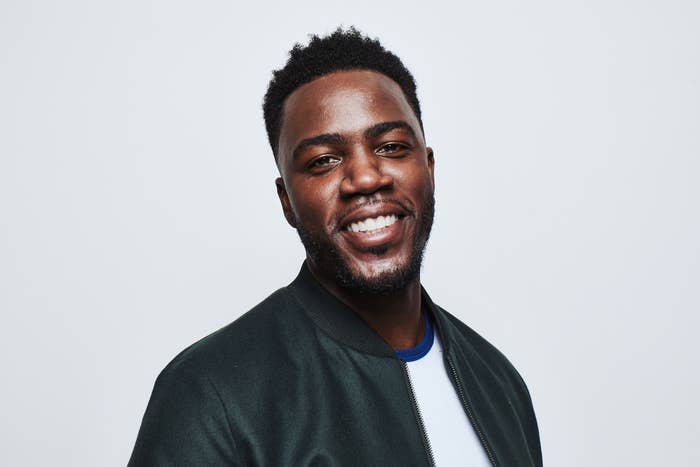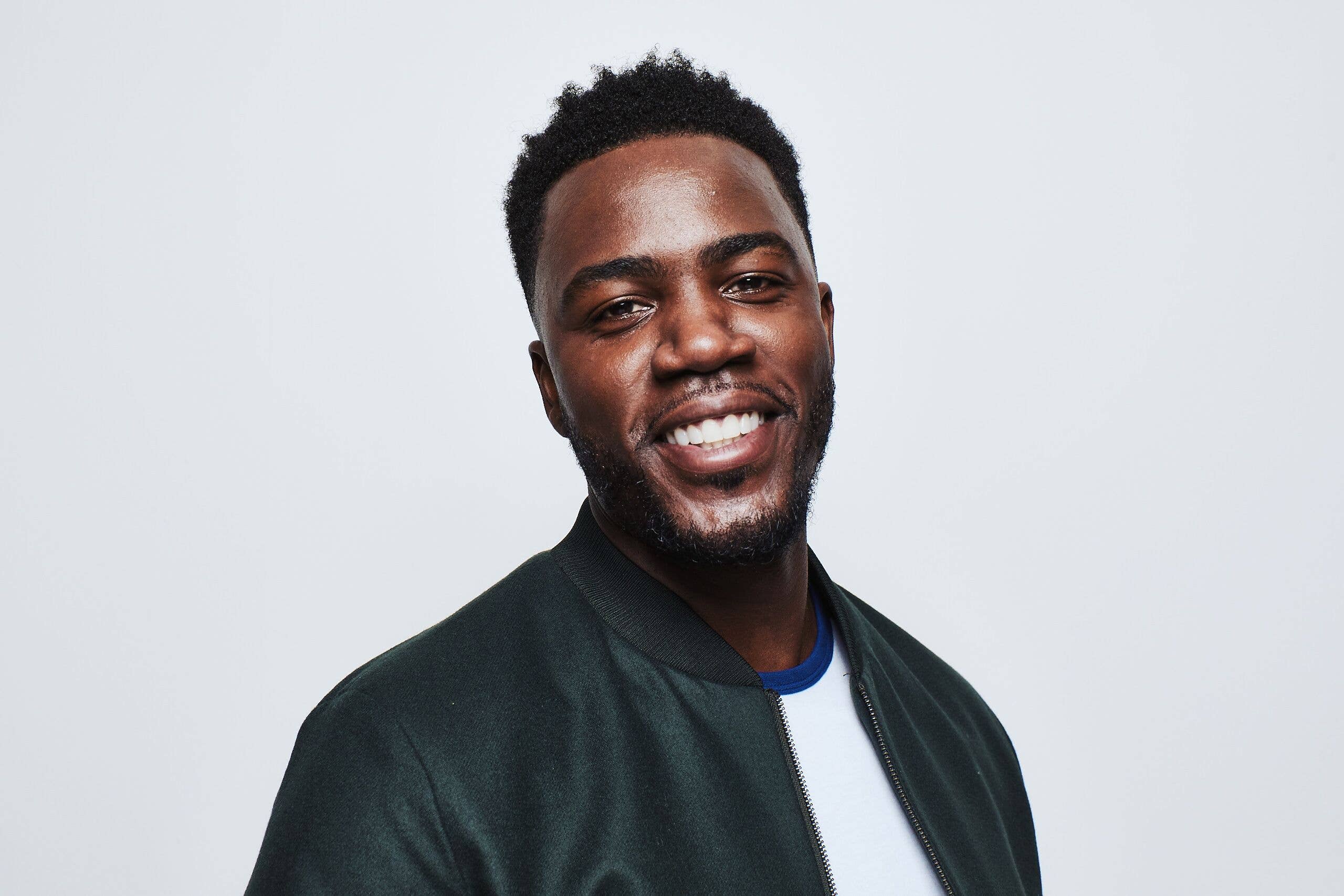
Since his meteoric rise in 2017, Mo Gilligan hasn’t stopped learning his craft. He’s been on the live circuit for almost a decade as a stand-up comic, at one point taking home only £50—or the promise of a better opportunity ‘next time.’ Still, even when he was doing shows at the Eritrean Independence Day in 2014, Gilligan savoured the chance to perform in front of an audience that didn’t see him as the main event. For him, that’s where the challenge and development lies—in doing the shows that nobody would expect you to, which is why it’s not all that surprising that since the Coupla Cans tour, his name has been ringing throughout the country. But his breakout moment wasn’t accidental, nor by chance. In fact, there were a multitude of varying factors that contributed to his recent rise, least of all his ability to impersonate British stereotypes in a way that turned a mirror to society, post-Brexit.
The now-classic line, “Julie, get a coupla cans in, luv” is almost representative of every football fan from Plymouth to Merseyside, and it’s somewhat scary that he’s been able to capture the essence of an Essex couple in short segments. It was only a matter of time before this funny man became the hottest ticket in town, whose history of impersonations go back a whole decade at The Sunday Show. Given the rising universality of London-born slang throughout popular culture, the cultural nuances in Mo’s comedy have not been completely lost on audiences. On the contrary; outside of London, Mo believes that he often receives a much more raucous reception. Much of that is down to the fact that while he is indeed a unique and gifted comic, Mo’s comedy is far more ubiquitous than that of Shadrack & The Mandem and DontJealousMe, his online predecessors.
During our conversation, Mo The Comedian salutes the aforementioned funny guys, as well as Jazzie and A Dot Comedian, who pioneered the online black comedy scene in the early days of YouTube. While it’s more than a matter of tracing and paying homage, Mo has been studying the craft for years, learning how comics have been adapting to new media, behaviours and trends. It begs the question as to whether his Insta vids would’ve worked out a decade ago, but everything has its time.
Now, with his own Channel 4 show on the way this summer, Mo understands the patience that comes with having your moment.
COMPLEX: What has the transition into TV been like for you?
Mo Gilligan: I like to learn a lot, so when I’m doing TV I’m always trying to better myself and ask more questions. This is my first real opportunity on TV so I always watch the shows back to see how I can improve. It’s fun, though; TV’s very different to stand-up and I don’t think some people realise that the shows on TV are edited, so they don’t always get the difference in style of humour immediately.
Stand-up or TV: which of the two are enjoying the most at the moment?
I’d say TV because I’ve been doing stand-up for quite a while, so it’s like muscle memory when you get up on stage. I’m enjoying TV because you get to see what it looks like. I’m recording on a Sunday and then you watch it on a Friday.
Do you feel like you’re learning more about yourself as a comedian?
Of course! That’s cool thing when you do TV because people have seen you do stand-up and the internet videos. Someone said, “How come Mo cuts people off in interviews?” I never knew I was doing that but, at the same time, it’s a helpful critique. But you can’t take the criticism to heart because everyone has opinions.
That must get hard to deal with sometimes.
Well, yeah. I think criticism is good... I don’t actively look for it, but you’ve gotta have a thick skin with it in this industry.
Well, there’s a thin line between unbiased and biased criticism.
The thing is that the hate is the hate but, because of how tough a lot these industries are, most people just brush it off. I’ve done stand-up for a long time so I’m used to criticism in all its forms, so when I do TV, it’s okay. Saying that, I don’t get as much criticism, so I’m blessed on that front.
Laughter is like a language everyone gets—you’ve just gotta bring it to people.
But it was much different in the early days, right?
With the criticism you get in stand-up, it’s often more honest because it comes down to what you like in a stand-up. When you’re first starting out, you’re finding your voice so you can’t take any of that critique to heart. Now I have my style and audience, I’m safer, but stand-up is an art form where you’re constantly evolving—especially as you get older. It’s the criticism from promoters that can be hard to take, but they’ve seen it and have been in it for years, so they tend to know what works. When you’re young, you think you know it all as well, and there was a naivety in myself. At twenty, I thought I could do Live At The Apollo.
Where are you at now with the Coupla Cans tour, in regards to how you feel about it?
It’s amazing to even be doing a tour. The first few dates were only ten dates and when I sold out the London shows, that was a surprise to me—especially as it was the first one. It weirdly just became a pattern where I was selling out one, then another, but when it started happening outside of London, that was overwhelming. The tour was a massive learning curve for me, in terms of endurance, because you’re performing sometimes four days in a row with one day off and then back out on the road again, so you’ve got to consider looking after your body. This is what I use—I don’t have a band, or dancers—it’s just me so I have to be mindful of how my body’s feeling. I love doing TV and it’s fun, but the live performance is special because you can see everybody coming out, dressed up, and it gives you that added pressure because this is their Saturday night.
Does the reception to specific jokes or skits differ regionally in the UK? I imagine people might not always get the cultural nuances.
I thought that at first because we’ve been to places like Plymouth and Norwich, and you wonder if they’re going to get what I’m about. Then when you get on stage, it’s like when people say football’s an international language and it’s the same with comedy. Surprisingly, outside of London is where I get the most laughter because, here, there’s so much going on in London on the weekend, and there’s a higher standard because there’s always a better option. People outside of London, in smaller towns and smaller cities, they would have waited months so it’s a big event for them. In big cities like London and New York, you’re competing with so much entertainment in so many forms. The lifestyle is different outside of London because people are only really going out on weekends and people often go home after the show, whereas someone in London is asking where the rave or shoobs is [laughs].
Whether people relate to a joke or not, they find an element of it funny even if they can’t explain.
Yeah, man. Laughter is contagious! I’ll see people laughing, knowing they didn’t get the joke but you can tell that they’re enjoying it. Comedy can sometimes transcend that need to be understood.
What’s been the most important part of your journey?
For me, it’s been finding an audience. I put videos out on social media then went on tour. I was doing stand-up before but people were betting on me, having not seen me on stage, because they had faith in me. As a comic, you play the clubs on the weekends for years but you may never find a solid audience doing that. I haven’t taken the conventional comedy path, such as going up to Edinburgh, but gaining an audience through social media and the tour allowed me to see who they are.
On social media, it’s a different type of reaction as you can’t see it in real-time.
People put an emoji and say it’s funny but you’re not hearing the laugh. Stand-up is different because you can see, hear and feel the laugh. Even on TV, when you see the other guests on Big Narstie laugh—like, Stephen Fry thinks man’s funny! [Laughs]
You mentioned that you hadn’t taken the Edinburgh route—why was that?
Well the thing is, I went about four years ago with comedian and friend Kae Kurd. We both went on stage for half an hour each and split a show, but we only did a two-week run during the month. I enjoyed it—people actually came to the show—but the route I took, I was creating my own content and platform so there wasn’t really a point in me going to Edinburgh because I’d found my audience. That’s what you go there for then you might come back to London and get a few gigs in Soho, if you did good. I just took a different path.
Then there’s that risk of going all the way to Edinburgh and not finding your audience.
Yeah, that’s it, but the cool thing about when we went up there was that people were telling us that they had fun. Normally at Fringe, people find out about shows through word of mouth so we were just flyering the street but we took a gamble as we just turned up, staying in a hostel like ‘we’re here now.’ It was really good to do because I do believe in trying every type of audience when it comes to comedy, and when I look back I realised that’s how I learned. I’ve performed at Indian weddings, not just black ones… Once I performed at the Eritrean Independence Day show in Shepherd’s Bush, but it was good for me and that’s how I found my voice. Laughter is like a language everyone gets—you’ve just gotta bring it to people... I’m not gonna lie, that’s a sick quote there.
Do you ever consider how you’re perceived as a black man, especially since doing the show with Big Narstie and being on TV?
Definitely. I felt it the most when the show first aired because black people were proud of it, but then the show has to be so many things to so many people. It’s also a representation of who I am, so you want to keep it original. I want it to appeal to everyone because having Stephen Fry on there means a roadman randomly watching can be like, “I don’t know who this Stephen Fry guy is but he’s funny, still.” The fact that I get to write the shows, I’m considering what people want to see.
And you’ve got your own show coming soon on Channel 4 as well?
Yeah, but it’s weird—I found out last year but people have been asking and telling me what to expect on the show, so there’s more pressure there. But I’ve been training as a sub on The Big Narstie Show, and now I’m on the first team. It’s coming out this summer. For me, I want to have a separate identity from The Big Narstie Show because it’s not my creation... I have to hold the cards close to my chest but people will be surprised.
Surprised in what way?
In terms of the ideas I’ve always had but haven’t been able to use because of the resources at hand. But now I can do it on my show, I want people to see that this is different to all the work I’ve been doing. It’ll be the same me, but I’m taking more risks with this.
It’s been a long time coming as well so patience is something you must be fairly comfortable with?
With TV, there’s a lot of patience to be had. If I’m doing a video at home, I can upload it in a few minutes or hours. TV is slower because there are pilots and then scheduling and you have to learn that some industries aren’t as fast. TV isn’t just my audience whereas YouTube is, so the aim is to have multiple series’ and I understand the patience now. You want to stay in the game as long as possible.
Which is interesting because when you look at where your breakout moment stands within the line of YouTube comedians in the UK, there’s a legacy which is being established.
DontJealousMe and I went to LA a few years ago with BET and people were still recognising him, so it’s not like he’s not irrelevant—he’s just doing different things.
It’s like with R.S. and Kayode Ewumi and this idea of letting characters go.
The emergence of people like Jazzie and Shadrack & The Mandem all inspired me. In the UK, I think it’s developed a lot which is why I think Kayode stepped away from R.S. because there’s more to black British humour. I was gassed when I went to America and people were connecting with my videos and the impersonations—it was a great sign that the UK is heading in the right direction with comedy.
Mo Gilligan was speaking on behalf of Lynx at the launch of Lynx’s new Ice Chill grooming products. Available nationwide now, the all-new bathroom essentials are designed to cool guys down and leave them feeling fresh and smelling great, helping guys to be the most chill version of themselves. Follow @Lynx on Instagram and Twitter or visit LynxForMen.com for more information.

